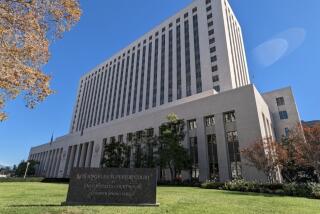D.A. Decides Watson Won’t Be Tried on Criminal Charge
- Share via
SACRAMENTO — Prosecutors announced Thursday that there is “insufficient evidence” to seek criminal charges against state Sen. Diane Watson (D-Los Angeles) for using state-paid staff and equipment in preparing her Ph.D. thesis and managing a private rental property.
But while dropping the possible criminal case, Sacramento Dist. Atty. Steve White agreed to look into separate allegations that Watson may have improperly used several thousand dollars in campaign funds for personal use--for travel and other purposes. The personal use of campaign money is a violation of civil law, carrying a penalty of twice the amount improperly spent.
Watson hailed the decision not to pursue criminal charges as a personal vindication.
“I am pleased the district attorney has confirmed the truth,” she said in a written statement. “At no time did I feel this would not have been the outcome because there was never anything criminal involved.”
But the Sacramento district attorney said he did find evidence that at least six Watson staff members worked on preparing the manuscript--one of them “spending substantial state time on this project.”
In a letter to the state attorney general’s office explaining his reasons for not pursuing criminal charges, White attacked the state Senate’s system for keeping track of employee time, observing that “a cynic might think it designed for abuse.”
One Watson aide, Renee Francis, “did the bulk of the typing of the dissertation,” spending half of her time in January and February of 1987 on the project, White said. The typing was done on a state computer. Other staff members helped in proofreading, editing and transporting the dissertation.
The thesis, on the impact of desegregation on the Los Angeles Unified School District, earned Watson a Ph.D. from Claremont Graduate School.
In his letter, White pointed to the difficulty of proving beyond a reasonable doubt that the thesis work was done at Watson’s direction by employees during their state-paid time. Francis, he said, was working as much as 70 hours a week during the period she was typing the dissertation. Because the time sheets of Senate employees do not show the actual hours they worked, there is no way to prove that Francis--or the other staff--was working on the thesis while on state-paid time.
For similar reasons, White also decided not to pursue allegations that another Watson staff aide, Jeanette Burton, spent state time overseeing the renovation of a rental property owned by Watson after an arson fire damaged the house.
Cliff Berg, executive officer of the Senate Rules Committee, defended the system for keeping track of employee work time as a “flexible system tailored to the needs of the Legislature,” where employees are often called on to work late into the night.
Senators “keep track (of employee time) enough to satisfy the Senate Rules Committee,” Berg said. “It is not our business to keep track of it for potential district attorneys.”
Won’t Pursue Case
Atty. Gen. John K. Van de Kamp, who has the power to press criminal charges on his own, agrees with White’s decision not to prosecute Watson and will not pursue the case any further, said Van de Kamp spokesman Alan B. Ashby.
However, White has agreed to complete an investigation launched by Van de Kamp into possible civil violations, involving Watson’s personal use of campaign funds.
The investigators have questioned thousands of dollars of travel expenditures and purchases made by Watson’s campaign committee during the last year, said Chief Assistant Atty. Gen. Richard D. Martland. “It would be unfair to give a specific dollar amount,” he said.
In an interview, Watson said she had no idea what the civil investigation was about. “I’m waiting for the other shoe to fall,” she said. “I’m waiting to see what they have so I can shoot them out of the water.”
More to Read
Sign up for Essential California
The most important California stories and recommendations in your inbox every morning.
You may occasionally receive promotional content from the Los Angeles Times.













